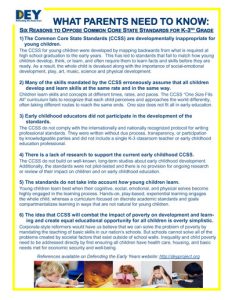 SIX REASONS TO OPPOSE COMMON CORE STATE STANDARDS FOR K-3RD GRADE
SIX REASONS TO OPPOSE COMMON CORE STATE STANDARDS FOR K-3RD GRADE
1) The Common Core State Standards (CCSS) are developmentally inappropriate for young children. The CCSS for young children were developed by mapping backwards from what is required at high school graduation to the early years. This has led to standards that fail to match how young children develop, think, or learn, and often require them to learn facts and skills before they are ready. As a result, the whole child is devalued along with the importance of social-emotional development, play, art, music, science and physical development.
2) Many of the skills mandated by the CCSS erroneously assume that all children develop and learn skills at the same rate and in the same way. Children learn skills and concepts at different times, rates, and paces.The CCSS “One Size Fits All” curriculum fails to recognize that each child perceives and approaches the world differently, often taking different routes to reach the same ends. One size does not fit all in early education.
3) Early childhood educators did not participate in the development of the standards. The CCSS do not comply with the internationally and nationally recognized protocol for writing professional standards. They were written without due process, transparency, or participation by knowledgeable parties and did not include a single K-3 classroom teacher or early childhood education professional.
4) There is a lack of research to support the current early childhood CCSS. The CCSS do not build on well-known, long-term studies about early childhood development. Additionally, the standards were not pilot-tested and there is no provision for ongoing research or review of their impact on children and on early childhood education.
5) The standards do not take into account how young children learn. Young children learn best when their cognitive, social, emotional, and physical selves become highly engaged in the learning process. Hands-on, play-based, experiential learning engages the whole child, whereas a curriculum focused on discrete academic standards and goals compartmentalizes learning in ways that are not natural for young children.
6) The idea that CCSS will combat the impact of poverty on development and learning and create equal educational opportunity for all children is overly simplistic. Corporate-style reformers would have us believe that we can solve the problem of poverty by mandating the teaching of basic skills in our nation’s schools. But schools cannot solve all of the problems created by societal factors that exist outside of school walls. Inequality and child poverty need to be addressed directly by first ensuring all children have health care, housing, and basic needs met for economic security and well-being.
